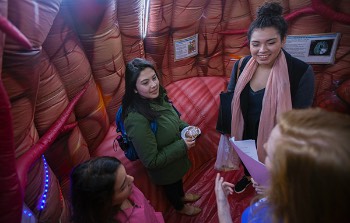Students Explore the Brain
 During Southern’s annual Brain Awareness Week in March, students were able to walk
through a blow-up replica of the human brain, learning about the effects of migraines,
strokes, seizures, and more. Jim Wampler, PsyD, director of the Student Support Services,
hosted the event.
During Southern’s annual Brain Awareness Week in March, students were able to walk
through a blow-up replica of the human brain, learning about the effects of migraines,
strokes, seizures, and more. Jim Wampler, PsyD, director of the Student Support Services,
hosted the event.
“Caring for the brain starts with understanding it,” Wampler said. “My hope for this event is to raise awareness and help more people realize how important the brain is.”
Southern biology students served as tour guides for the event. They led elementary school groups, community members, and many Southern students through the exhibit, sharing relevant information. Among other things, they included these preventative actions: exercising daily keeps the mind active and helps with blood flow, drinking water each day helps prevent migraines and headaches, and eating the right foods is another way to keep the brain healthy.
“I was amazed at what happens if certain parts of the brain malfunction, as well as how working out makes such a huge difference,” said Rebecca Preval, senior marketing major. “It is amazing that what we feed our brain can potentially destroy our brain cells and then we can not get them back, but also how we can grow our brain cells and make them healthy.”
Jocelin Morales, junior nursing major, enjoyed the exhibit and felt it was relevant to everyone, not just people in the medical field.
“Seeing the structure of the intricate brain system made it all come to life,” she said. “It was truly amazing to see the information that we study in the classroom in such a practical way, helping us understand more about how the brain functions.”
